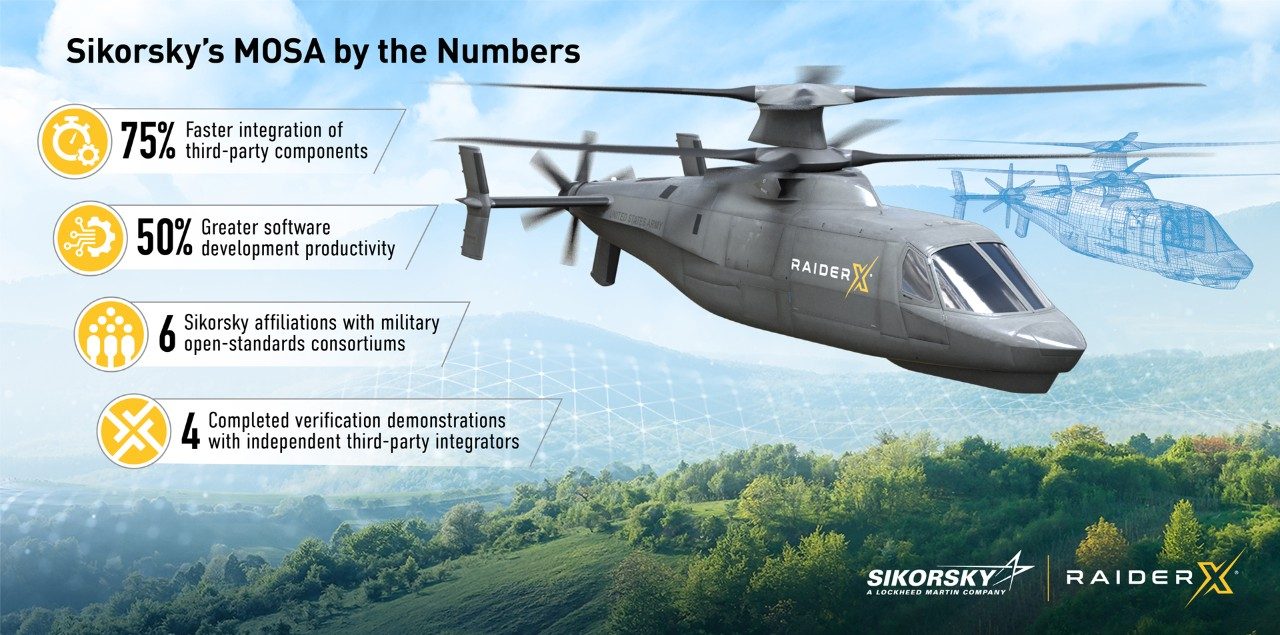Sikorsky’s RAIDER X® Digital Backbone Drives Success for the Army’s Modular Open Systems Approach
This year, the U.S. Army plans to hold the first of two Modular Open Systems Approach (MOSA) verification demonstrations as part of its competition for the Future Attack Reconnaissance Aircraft (FARA). As one of two companies vying for FARA, Sikorsky, a Lockheed Martin company, is demonstrating success, having already completed four verification demonstrations with third-party integrators validating its MOSA in preparation for the first Army led event.
The results? Sikorsky’s MOSA has enabled third parties to independently integrate capability into the system, cut the effort to introduce these capabilities by almost 75 percent and increase software development productivity by 50 percent, compared to traditional methods. These efforts will save the Army time, money and complexity in an effort to outpace threats.
FARA finalists must demonstrate that their designs meet the Army’s MOSA standards. Much like the way apps can be easily installed or updated on smart phones, MOSA enables the government to rapidly integrate system capability and component upgrades in a vendor-neutral way to meet new and evolving threats. This also streamlines maintenance and sustainment.
“MOSA is about ensuring the Army efficiently evolves with the pace of change for technology and battlefield dynamics,” said Kirk Avery, mission systems Senior Fellow at Sikorsky. “MOSA enables service members to perform their missions.”
RAIDER X is Built on MOSA
Sikorsky is offering RAIDER X® for the Army’s FARA program. RAIDER X is designed and built from the ground up to meet the Army's exacting MOSA requirements and standards utilizing a Model-Based Systems Engineering (MBSE) approach.
RAIDER X aligns with nose-to-tail standards for the Weapon System components, interfaces and network infrastructure. These standards comprise hundreds of system requirements that are met through a comprehensive model-based architecture description and associated architecture analysis. MOSA performance is assessed through technical performance measures evaluating the modeled architecture and program demonstration events.
“The Army is not physically on an aircraft following every wire to every component to validate our adaptability,” said Matt Oehler, Future Vertical Lift systems engineering director at Sikorsky. “That is why it’s so important that the architecture standards are met. The Army must rely on the architecture’s description within the system model to evaluate our solution.”

Proving MOSA
During the Sikorsky-funded verification events, Army scenarios – based on MOSA-use cases – run the RAIDER X architecture through its paces. Both large defense contractors and small businesses introduce new capabilities and validate MOSA adaptability.
The RAIDER X digital backbone is proving it can quickly and efficiently integrate with third-party hardware and software meeting the Army goals.
In one recent exercise, Sikorsky and third-party integrators demonstrated the introduction of third-party avionics with the RAIDER X’s digital backbone and third-party software to communicate with the new avionics. The helicopter crew was able to display and manage the sensor information in the cockpit seamlessly.
Sikorsky’s other third-party verification efforts are proving just as successful, integrating lessons learned to greatly improving capability.
“We don’t expect or want the exercises to run perfectly,” said Avery. “We want to find areas to improve and increase efficiency. We want to demonstrate for the Army that MOSA is foundational in everything we do – in every decision, every trade – and it’s inherent in our architecture. “We’re continuously evolving our solution so we can provide the Army what they need for their solutions and warfighter missions.”
Leveraging Best Practices
Lockheed Martin has long been an industry leader in partnering with the government to advance open architecture solutions. This expertise enables RAIDER X to bring to bear the full strength of the Corporation for its MOSA solution including model-based architecture.
In particular, Lockheed Martin helped to establish – and co-leads – the Object Management Group (OMG) Model Based Acquisition (MBAcq) user group. Through OMG MBAcq, Lockheed Martin and companies across the industry are working with the Department of Defense to share best practices and guidance to successfully deploy a common set of MBAcq standards that support MOSA objectives throughout all acquisition phases.
In addition to Lockheed Martin’s leadership in OMG MBAcq, Lockheed Martin Sikorsky has maintained active participation in a number of military open-standards consortiums including the Future Airborne Capability Environment (FACE), Sensor Open System Architecture (SOSA), Open Mission Systems (OMS) Architecture Collaboration Working Group (ACWG) and the Interface Control Working Group (ICWG).
This familiarity led Sikorsky to incorporate MOSA solutions following open standards into projects such as:
- Combat Rescue Helicopter’s tactical mission kit
- Sikorsky Open Architecture Cockpit
- MH-60R
For the Army, MOSA is critical to encouraging competitive acquisitions, improving affordability, increasing readiness and reducing the timeline for fielding new capabilities, and Sikorsky is making MOSA a reality for FARA with RAIDER X.
RAIDER X® is a registered trademark of the Lockheed Martin Corporation




